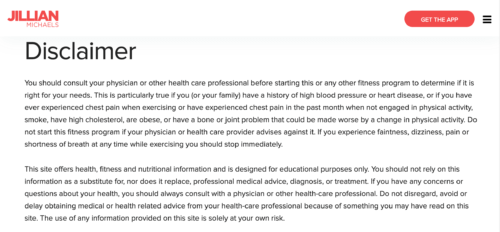The Data Protection Act (DPA) 2018 is the UK's updated data protection law which became effective on 25th May 2018 and was recently amended on the 1st January 2021 to reflect the United Kingdom's exit from the EU. It sits alongside the UK GDPR and replaces the Data Protection Act 1998. The United Kingdom is […]
Fitness Disclaimer with Examples
What is a fitness disclaimer and who should be using it?
A fitness disclaimer is a legal statement on your website that informs your readers and users that the information contained on your site is for educational and informational purposes only. If your website offers health and fitness content then a fitness disclaimer is advised.

On this page
What is a Fitness Disclaimer
A fitness disclaimer is a legal notice on your website that helps to reduce the incidence of legal liability for informational content surrounding health and fitness. It contains information that informs your readers that the content found on your website is designed for educational and informational purposes only. It states that the information found on your site should not be used as a substitute for professional advice and suggests that you contact your medical professional prior to beginning a new diet or exercise regime.
Like other disclaimers, a fitness disclaimer helps reduce liability should a reader decide to pursue legal action based on your website content.
Although a fitness disclaimer is not mandatory it is advised that your website uses one if you cover these topics.

Who should use a Fitness Disclaimer?
Any website that contains information on health and fitness should be using a fitness disclaimer, these include the following:
- fitness and health blogs: blogs containing information relating to fitness and health often make suggestions for new exercise routines and/or eating plans. To ensure your readers will not take this as fitness and medical advice and later begin legal action against you for any injury they may sustain then having a fitness disclaimer is a way of reducing your legal liability. (see below for an example from FM Fitness and Nutrition's blog)
- gym websites: websites that advertise gyms and gym memberships often include articles relating to fitness and health. It is important to add a fitness disclaimer to this type of website. ( see below for an example from Pink Gym's website)
- fitness trainer websites: as with majority of business websites these days, a fitness coach's website will most likely contain a blog or at least articles containing information on health and fitness. For this reason it is once again advisable to include a fitness disclaimer oin this type of website. (see below for an example from Jillian Michaels' website)
- government fitness websites: government fitness websites can include articles that give a lot of information regarding fitness related topics. These website also include fitness disclaimers so that readers understand that government fitness websites can include articles that give a lot of information regarding fitness related topics. These website also include fitness disclaimers so that readers understand that the government agency will not be held liable for any loss or damages suffered by a person using the website. (see below for an example from Fitness Australia's website)
Examples of Fitness Disclaimers
Below are a selection of examples of fitness disclaimers taken from a variety of fitness websites. They show how important it is to include a disclaimer on this type of site.
Fitness and Health Blogs
Below is an example of a fitness disclaimer found on FM Fitness and Nutrition's blog

Gym Websites
This is part of the disclaimer found on the website pinkgym.com.

Fitness Trainer Websites
Here is an excerpt taken from the disclaimer of well known tv fitness trainer Jillian Michaels.

Government Fitness Websites
Lastly here is the disclaimer found on Fitness Australia (government) website.

Conclusion
Fitness disclaimers are used to help reduce legal liability of a blog or website in case of any legal action. They are advisable for any website that contains information on health and fitness. Sites that should be including a fitness disclaimer are fitness and health blogs, fitness trainer websites, gymnasium websites and government fitness websites.
Disclaimer
The information in this article is for informational purposes only and should not be construed as legal advice on any matter and does not create a lawyer-client relationship
